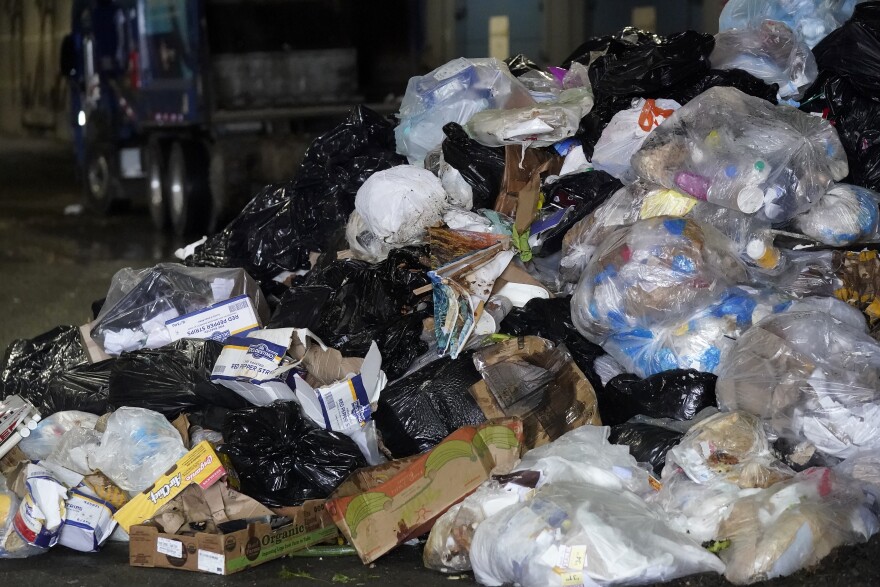PORT ST. LUCIE, Fla. — On a quiet night along Gatlin Blvd, a car pulls up behind Aldi supermarket. The sound of shifting cardboard breaks the silence as a local resident rummages through a dumpster searching not for trash, but for treasure.
Dumpster diving, the practice of salvaging discarded items from commercial trash bins, is gaining traction in Port St. Lucie as inflation and cost of living concerns push residents to look for creative ways to get food and supplies.
“You’d be shocked at what stores throw out,” said the 65-year-old retired woman who identified herself only as Rose. “I share the stuff that I get with my neighbor because I can’t eat it all by myself.”
Rose sits in the car and waits for her husband to retrieve the items from the dumpster. He comes back smiling with two large red bags filled with goodies. It was more than he could carry.
READ MORE: SNAP cuts leave Miami-Dade families relying on overstretched nonprofits
Dumpster diving has gotten so common that some stores have employees keeping an eye on the trash cans. Every time Nickiel Dodd, an assistant store manager at Aldi’s, steps outside to make his mandatory dumpster checks — seven a shift — he “observes the trash cans to make sure that no one is looting.” Because Aldi’s is on private property, Dodd adds, he could call the police and report dumpster divers for trespassing.
Al, 71, is a local Port Saint Lucie resident who dumpster dives everyday to supplement his Social Security checks. He goes from dumpster to dumpster around six to seven per day, he estimates, sharing what he finds with a 91-year-old friend.
“Social Security: I get $1225 a month. That doesn’t even pay the rent. How are you supposed to eat, pay for your medication and everything else?” said Al. “There is no money, I work a part time job, and there is no money.”
Although dumpster diving is not specifically prohibited in Florida, trespassing regulations still apply. Additionally, the majority of dumpsters in Port St. Lucie are either on private property or hidden behind enclosures, so if a diver is discovered inside a restricted area, they may face criminal charges.
Kari Hughes, a branch manager at Winn Dixie, said that whenever she sees someone in the dumpster, she’s hesitant to report them. Instead, she asks them not to go in the trash for food.
“I just caught a lady in the dumpster a few days ago and she said it was for her cat, we had just thrown out meat and she was in there,” said Hughes. “We get them [dumpster divers] all the time.”
But warnings don’t do much to deter people. All day long, at grocery stores, different cars pull up and drivers get out and check the dumpster to see what is inside. While many use a grabber to reach inside, most climb in to retrieve some of the mounds of food the store is throwing away every day.
Generally speaking, staff take out three to four carts of food and trash per shift. Store managers say that good, edible food is usually donated to the Treasure Coast Food Bank and other smaller organizations and that the produce and other goods going into the garbage is bad.
“We throw out spoiled food,’’ said Dodd. “We don’t want people getting sick because they are going to say that they got sick from Aldi.”
For those who dumpster dive rather than going to food banks, health hazards loom large. Food waste can harbor bacteria and other items that end up in the garbage can pose a physical threat to dumpster divers. Discarded electronics might contain toxic materials and sharp metal or glass poses injury risks.
On the evening that Rose and her husband showed up, there were watermelons, bags of potatoes, eggs, bell peppers, ripe bananas and more. “I give the food to our dogs too,” said Rose. “The meat and stuff I use to feed my dogs and again I share it with my neighbors too.”
This story was produced by MediaLab@FAU, a project of Florida Atlantic University School of Communication and Multimedia Studies, as part of a content sharing partnership with the WLRN newsroom. The reporter can be reached here.





